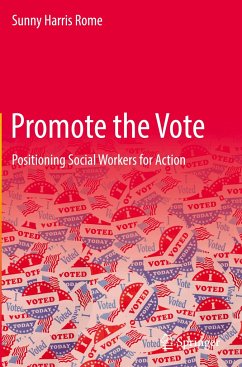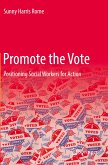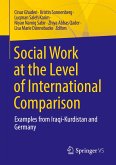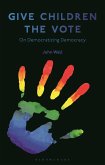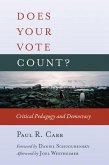This timely, relevant text is a comprehensive compendium of critical information about voting in the United States. It frames voting as an integral aspect of social work practice and provides concrete suggestions for how students can increase their involvement in expanding voter participation by marginalized groups.
This book:
Examines the current social and political context Introduces multiple perspectives on why voting mattersPresents a brief history of voting rights in the United StatesExplains the nuts and bolts of campaigns and electionsDiscusses who votes and who doesn't, how people vote, and whyDescribes voter suppression tactics and identifies obstacles facing low-turnout groupsHighlights strategies to expand voter participationProvides concrete examples of how students can help maximize voter participationExplores how voter engagement intersects with social work at all levels of professional practice
The only social work textbook devotedentirely to the topic of voting, Promote the Vote: Positioning Social Workers for Action is the ideal supplement for classes in social welfare policy, policy practice, human rights, and social justice. Filled with research findings, practical information, and case examples, this book provides social work students and professionals with the knowledge, strategies, and tools to engage clients and their communities in the electoral process. With voting rights quickly becoming a flashpoint in the struggle for equity and justice, now is the perfect time for this valuable resource.
This book:
Examines the current social and political context Introduces multiple perspectives on why voting mattersPresents a brief history of voting rights in the United StatesExplains the nuts and bolts of campaigns and electionsDiscusses who votes and who doesn't, how people vote, and whyDescribes voter suppression tactics and identifies obstacles facing low-turnout groupsHighlights strategies to expand voter participationProvides concrete examples of how students can help maximize voter participationExplores how voter engagement intersects with social work at all levels of professional practice
The only social work textbook devotedentirely to the topic of voting, Promote the Vote: Positioning Social Workers for Action is the ideal supplement for classes in social welfare policy, policy practice, human rights, and social justice. Filled with research findings, practical information, and case examples, this book provides social work students and professionals with the knowledge, strategies, and tools to engage clients and their communities in the electoral process. With voting rights quickly becoming a flashpoint in the struggle for equity and justice, now is the perfect time for this valuable resource.

